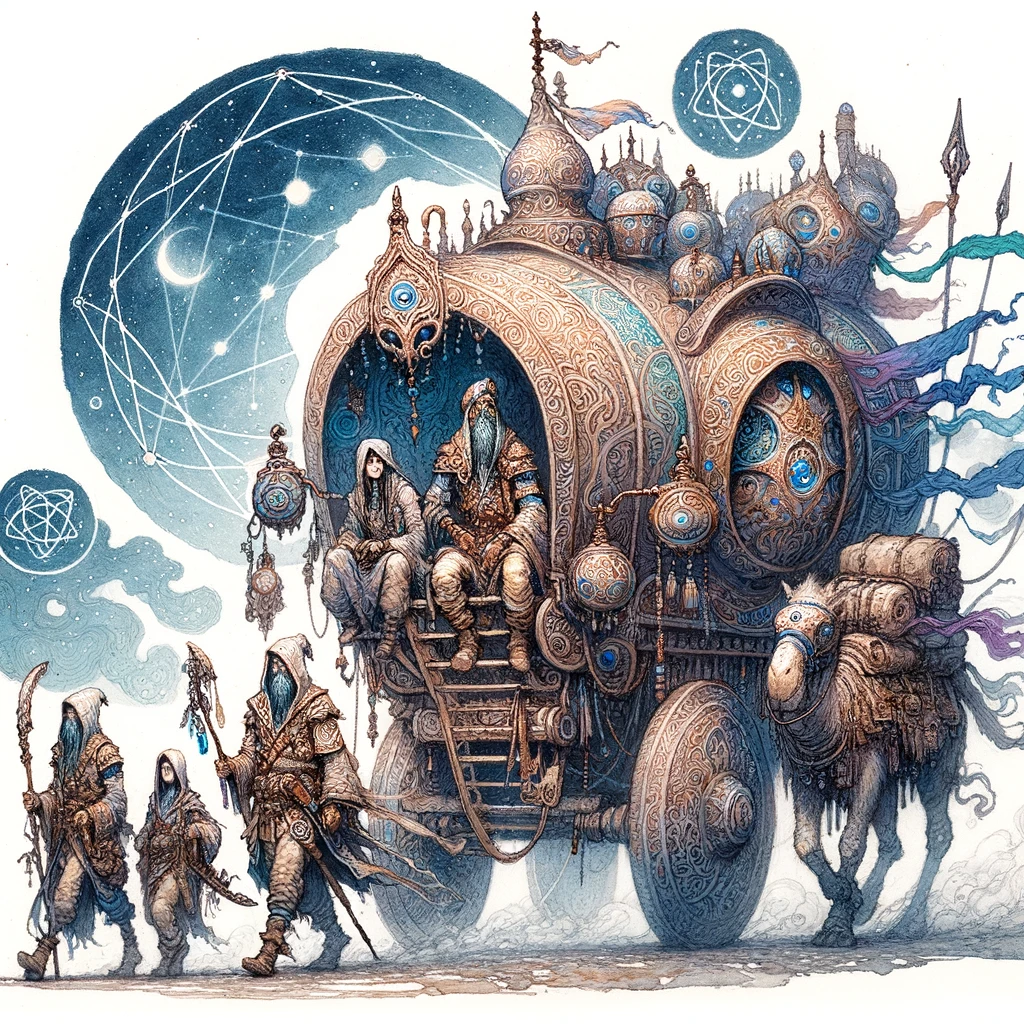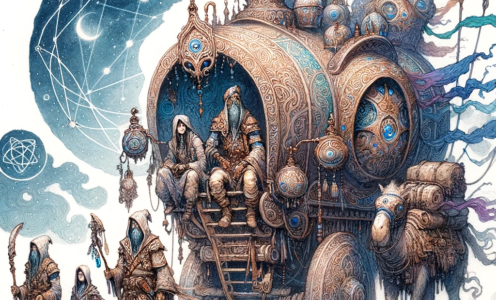Bene Idanim
| CLIMATE/TERRAIN: | Any |
| FREQUENCY: | Very Rare |
| ORGANISATION: | Solitary or Tribe |
| ACTIVITY CYCLE: | Any |
| DIET: | Omnivore |
| INTELLIGENCE: | Genius or more (17+) |
| TREASURE: | Variable |
| ALIGNMENT: | Neutral (apparently) |
| NO. APPEARING: | 1-20 |
| ARMOUR CLASS: | Varies |
| MOVEMENT: | 12 |
| HIT DICE: | Varies |
| THAC0: | Varies |
| NO. OF ATTACKS: | 2 |
| DAMAGE/ATTACK: | By weapon type |
| SPECIAL ATTACKS: | Varies |
| SPECIAL DEFENCES: | Varies |
| MAGIC RESISTANCE: | 25% in not magic-using, else nil |
| SIZE: | M (6′ tall) |
| MORALE: | Fearless (20) |
| XP VALUE: | Varies |

“From the Dawn of Time we have been here. Human, when our brethren were still animal savages. We are human, and we have a purpose.”
The Bene Idanim (a blood can hear the capital letters) have existed for as long as any records exist. They walk the planes searching, learning, exploring and influence the Multiverse as they travel through.
It’s said they have a task they were set to complete, far in the past, a task to which they have committed their whole existence. A closed society, with a secret hidden agenda, they have been welcomed into every possible town, hunted out of every realm. Chant goes even the powers fear them, for Bene Idanim are said to know the future, and make it happen. Bene Idanim are said to be arranging things for this future they see. They have been everywhere across the planes, their hand seen in almost every major plane-spanning event. It is said they have been active in the downfalls of gods, the Blood War, and some even believe, the initial programming of the modrons. But idle chatter costs lives, and nobody can really say for sure. It might even all be screed…the Bene Idanim posture so subtly that a blood’d do well to avoid ruling anything out.
They travel the Multiverse, take a jaunt to the Abyss, stop at Sigil, pay a visit to Mount Celestia. They perform tasks, arrange things, make sure certain things happen. These tasks can be as difficult as stopping an uncivil war between two Abyssal lords, or a simple as killing a certain petitioner, or as obscure as throwing an egg into Limbo at a certain time.
None know why they do this, how they are guided and who laid them down to this, but Bene Idanim has been doing what they do since before any records of written history.
COMBAT: The Bene Idanim practice amongst themselves powerful magics and psionics, and are well versed in ways of battle. The Bene Idanim know they must survive to complete their tasks, and thus will fight or flee as necessary.
It seems like no two have the same powers or abilities, but all share an unearthly knack for predicting their opponents’ every plan and preempting it. Cutters call it the Sight, and leave it at that. You’d better be warned to keep on the good side of the Bene Idanim, or else be able to defend yourself from plots so carefully crafted that you’ll not spot the trap till you’re well and truly caught.
Some Bene Idanim wield psionics, some use magic, some are tough with the blades, but none follow the powers. Perhaps they know something the mortal races don’t. Perhaps no power’d have them. Who can tell? All that a wise cutter’ll say is that the Bene Idanim are each as individual and unpredictable as their plots.
HABITAT/SOCIETY: Bene Idanim initially appear to be human; they look like humans, they have feelings and emotions — and yet a sad sense of duty hanging over them; it’s as if they know they have to continue their fate-creating lives despite everything.
The strange thing about them is that they have been around even before humans ever came to the planes. When man was still a savage beast roaming forests and planes the Bene Idanim were talking with powers and beating the fiends at their own games. The bloods even preceded faerie creatures, apparently: Elves were still simple hunters and gatherers a millennia after the Bene Idanim roamed the Multiverse. Some say the Bene Idanim even have a hand in the creation of mortal civilisation. ‘Course, you can’t believe everything you hear.
And not even the gods know for certain, as most weren’t even powers when Bene Idanim first walked the planes.
The Bene Idanim have a tribe-like culture built around the elders who command the rest of Bene Idanim. The young spend their youth with the elders, learning. The adults, men and women alike, are the ones who perform the different tasks. The elders also take part in this, but only in dire cases and terrible occurrences or when something special needs to be done.
Bene Idanim travel in tribes, like many prime gypsy bands. They usually have caravans, carts and horses, and travel through the larger portals and gates scattered around the planes. This does not mean they all stick together and perform the same tasks; the majority of adult Bene Idanim travel alone or in pairs across the planes committed to their tasks. Others travel with the elders and young except to help provide for them, and protect them.
The right hand of the Bene Idanim are the Companions. These bashers are yet another reason the Bene Idanim are hated. The Companions are an assortment of different creatures, from humans to tanar’ri, from aasimar to modrons. They are said to be those rare poor sods who accidentally stumble across the truth about the Bene Idanim. These cutters, after they discover the dark of things, suddenly change. They abandon their lives and possessions, leave their families and friends and go with the Bene Idanim. They travel with the Bene Idanim, aiding them, protecting them, and generally serving them. It is said that no one is immune to this fate, and that even powerful creatures such as balor or planetar who were too curious for their own good, or in the in the wrong place at the wrong time, fall in and join with the Bene Idanim.
Companion and Bene Idanim alike have been hunted by those who don’t understand them, their task or their reasons. Chant goes the powers cannot harm them or interfere with their tasks, and thus despise them; some even downright fear them. As a result, no Bene Idanim will ever enter a god’s realm unless compelled to by his tasks. If it’s possible, he’ll simply avoid it, going around if possible.
On the other hand, the tanar’ri, baatezu, aasimon and other powerful races have never shown such restraint.
ECOLOGY: In a way, being so powerful and able to survive, yet weak and hunted, is what brings much of the hate and prejudice against them.
The Bene Idanim frequent Sigil, and use it as a stop before going on their planar travels. In Sigil they offer some of their knowledge and services. Occasionally a tribe will sell some of the curiosities they have collected over time and a persistent cutter will find their mages and fighters offer lessons for the right garnish. This is how the Bene Idanim generally support themselves.
They will at times, agree to let outsiders travel with them, to learn the art of battle from one of their seasoned warriors, or the inner way of the mind from their genius psionicists. This only happens after the outsider takes a vow to aid and protect the tribe for as long as he travels with it, and not to ask questions concerning their actions; to learn only what they tell him, and no more. These strict rules put off some, but the knowledge of the Bene Idanim always draws others. It’s a perilous journey, however, for some bashers inevitably learn too much and become Companions.

Rhys slept fitfully, an unusual circumstance for the Factol of the Ciphers. Ordinarily, the tiefling had no trouble clearing her mind of the day’s events and sinking into restful slumber. Tonight was different
Without warning, Rhys sprang from the bed, her hands grasping the tunic of the mysterious stranger standing at the foot of her bed. The dagger she kept at her bedside nestled against the stranger’s exposed throat.
“Who are you and why are you in my room?’ she asked calmly, as though she were purchasing cloth at the bazaar.
In response, the stranger simply pointed. Rhys looked, and saw three tiny dots of fresh red paint, arranged in a small triangle on her bedpost.
When she turned to question the stranger further, she discovered that she held only an empty tunic…
Source: David Alexander and Jon Winter-Holt


